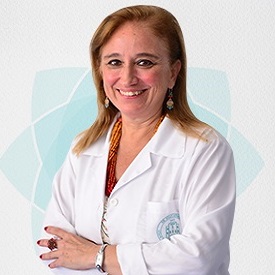
Dr. Suat Günsel University of Kyrenia Hospital Chest Diseases Specialist Prof. Füsun Yıldız MD., made a statement about 1-7 April Cancer Week :
“ Cancer is the name given to malignant tumors that appear in an organ or tissue resulting from an uncontrolled division of cells. There are more than 100 different types of cancer. As a result of many inherited and environmental factors, cancer develops from changes that cause normal cells to acquire abnormal functions and unchecked cell growth. Cancer cells can be carried in the bloodstream or lymphatic system and spread to other parts of the body. These escaped cells can then grow and form other tumours, which are known as metastases.
“3 factors increase the risk of developing cancer”
1-Genetic Factors: Individuals are at risk of developing cancer if one family member is diagnosed with cancer at a younger age, three or more generations has the same type of cancer, more than three relatives of the mother or father has cancer and also if a family member has two or more different types of cancer. Genetic screening tests should be performed if cancer is suspected to be hereditary.
2. Environmental Factors: The environmental conditions in which you live or work can create a risk factor for cancer development. One of these risk factors is active and passive tobacco and tobacco product exposure. Asbestos, radon, air pollution, UV radiation are other environmental risk factors for cancer development.
3. Biological risk factors: Physical characteristics such as age, sex and race.
Early Diagnosis is Very Important in Cancer As it is in Every Disease
So what are the symptoms of cancer? Knowing the symptoms of cancer is important for an early diagnosis of the disease, but having one or more of these symptoms does not mean that the person has cancer. These symptoms can vary, depending on the organ where the cancer has developed. These symptoms include; fever, weakness, pain, lumps detected by hand, changes in skin, bleeding, defecation and changes in urination, coughing, changes in moles and warts. For example, symptoms of lung cancer include; coughing, coughing up sputum with blood, shortness of breath, chest and arm pain, hoarseness, recurrent lung infections, neck and face swelling, loss of appetite and weight loss.
Early diagnosis is very important in cancer as it is for any disease. Therefore, we can prevent the development of such malignant tumors in our body by removing the risk factors mentioned above by consuming natural foods to strengthen our immune system and avoiding use of tobacco and tobacco products. If cancer is not diagnosed at an early stage and it not treated, it can cause serious problems and could even lead to death. For this reason, the awareness of cancer needs to expand and the development of diagnostic and treatment methods needs to develop which will reduce death related to this disease. “
Resources
- Ministry of Health of Turkey , Directorate General Health Education web site.
- Turkish Thoracic Society, educational books series ‘Living with lung cancer’